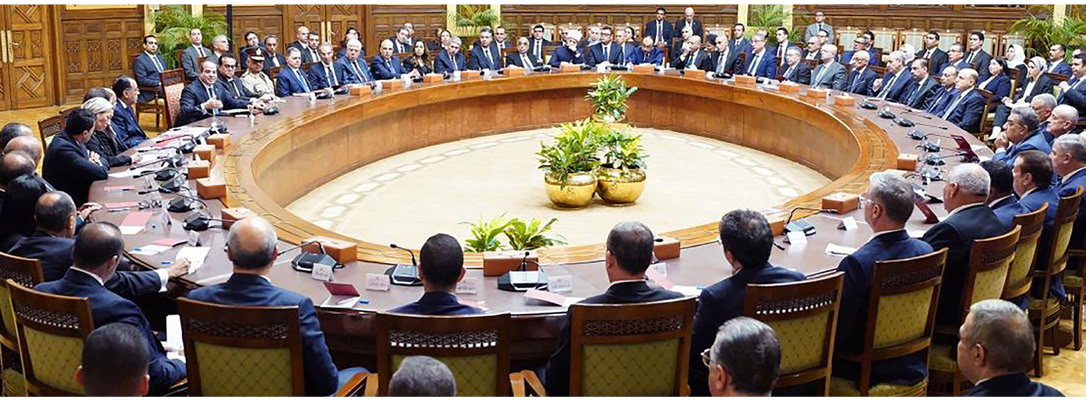CAIRO: Egypt's President Abdel Fattah El-Sisi swore in a reshuffled Cabinet on Wednesday that includes new finance and foreign ministers in a government facing challenges including the Gaza war, a struggling economy and daily power cuts.
El-Sisi reappointed Prime Minister Mostafa Madbouly and said his new govern- ment should focus on lowering inflation and boosting investment.
The president tasked Madbouly and his administration with achieving a number of goals, including maintaining national security in the face of regional and international challenges; prioritization of initiatives to help the Egyptian people develop and advance, particularly in the fields of health and education; and the continuation of efforts to improve political engagement.
The reshuffle followed a directive from El-Sisi calling for changes to government policies to keep pace with the challenges faced by the state, in response to which Madbouly tendered the previous government’s resignation to the president on June 3.
Kamel El-Wazir, who has been minister of transport since March 2019, is now minister of industry and transport, and will also serve as the deputy prime minister for industrial development.
Khaled Abdel-Ghaffar is minister of health and population, and deputy prime minister for human development.

President Abdel Fattah El-Sisi meets new government members in Cairo. (AFP)
Lt. Gen. Abdel-Maguid Sakr becomes minister of defense, replacing Mohammed Zaki.
Badr Abdelatty is the new minister of foreign affairs and emigration and expatriate Affairs, replacing Sameh Shoukry, who previously held the foreign affairs role, and Soha Gendi, who handled emigration and expatriate affairs.
Amr Talaat remains as minister of communications and information technology, while Rania Al-Mashat, previously minister of international cooperation, becomes minister of planning, economic development and international cooperation.
Ayman Ashour continues in the post of minister of higher education and scientific research, which he has held since August 2022, and Hani Sewilam remains as minister of water resources and irrigation.
Mohammed Sheemy is the new minister of public business sector. He succeeds Mahmoud Esmat, who becomes minister of electricity. Ahmed Kouchouk takes over as minister of finance from Mohammed Maait.
Manal Awad Mikhail becomes minister of local development, replacing Hisham Amna, while Sherif Farouk takes over as minister of supply and internal trade from Ali Moselhi.
Usama Alazhary replaces Mokhtar Gomaa as minister of religious endowment, while Mohammed Gobran succeeds Hassan Shehata as minister of labor.
Mahmoud Tawfik continues as minister of interior and Yasmine Fouad remains minister of environment, positions they have held since 2018.
New Finance Minister Kouchouk, a former World Bank economist, said after being sworn in that Egypt was committed to fiscal discipline, bringing down debt, and structural reform to allow for private sector growth.
An influx of funding from the UAE, the IMF, and the EU has eased a chronic foreign currency shortage in Egypt, but power cuts and gas shortages have left businesses and families struggling.
Karim Badawi, an oil services manager, was appointed petroleum minister and said supplying fuel to power stations would be a priority.
Sherif Farouk, who took over at the Supply Ministry, which manages a food subsidy program that feeds more than 60 million people and is a target for reform, is former head of Egypt Post.
Analysts say radical change is needed to make Egypt’s economy more stable, including the state and military ceding space for the private sector.
“We need to have a plan from now, which is a new growth model, a new development model,” former Investment Minister Mahmoud Mohieldin said.

























